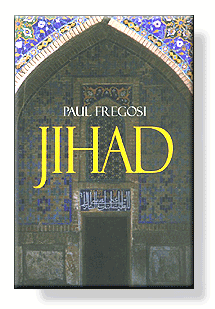
The Jihad, the Muslim Holy War against Christians and other faiths, has raged in the Middle East, Europe, Africa, and Asia for over 1,300 years, and has now reached the Americas. The Muslim military conquests of former centuries and the terrorist campaigns of recent decades share more than just the name Jihad. They are both expressions of the Muslim distaste for, and basic antagonism to, the entire non-Muslim world, which it shows by doing battle against those it perceives as blasphemers and infidels. For over a century and a half the world had forgotten this fact, since most Muslim countries were politically impotent and ruled mainly as the colonies or protectorates of European powers. But recent events in Iran, Afghanistan, and elsewhere have reminded us of the Muslims' existence and newly won power. Jihad is back.
Even though the Jihad has been a fact of life in much of the world for more than a millenium, it remains the most unrecorded and disregarded major event in history. Jihad in the West seeks to redress this oversight. It is the first and only general history of the Jihad, with a concentration on Europe. In a lively, readable style that often recalls the mordant satire of Juvenal and Evelyn Waugh, historian Paul Fregosi gives an engrossing account of the universal and little-known Islamic military invasions of Europe and the major players who led them, as well as the mighty warriors who opposed them. The story begins around 650 C.E. with the first, unsuccessful siege of Constantinople, and continues with the invasion and occupation, sometimes for hundred of years, of many European countries. Italy, Sicily, Portugal, France, Spain, Austria, Bosnia, Serbia, Croatia, Hungary, Rumania, Wallachia, Albania, Moldavia, Bulgaria, Greece, Armenia, Georgia, Poland, the Ukraine, and eastern and southern Russia were all battlefields where Islam conquered or was conquered in violent conflicts marked by cruelty, bloodlust, and a fearful loss of life, spread over considerably more than a thousand years.
While European history has remained transfixed on the Christian Crusades of the eleventh to the thirteenth centuries, it has largely ignored these Muslim attacks and invasions. Fregosi's powerful study realigns this skewed historical vision to correct a perception of the Crusades and of later colonialism that has greatly affected the modern political thinking of Muslims (particularly those in the Middle East) toward the West. When accusing the West of imperialism, Muslims are obsessed with the Crusades, but have forgotten their own longer and more gruesome Jihad.
A writer befriended and greatly admired by the novelist Graham Greene, Fregosi faced a wall of opposition to Jihad in the West; the release of this controversial book was abruptly canceled by a publisher in Britain due to what some believe to have been fear of Muslim reprisals. “There's an intention to censor what's going on about Islam, more so than for any other religion,” Fregosi recently told the London press.
But with increasing Islamic extremist violence around the world, from the downing of Pan Am 103 to the bombing of the World Trade Center, the full story needs at last to be told, since the terrorism of today finds its direct antecedent in the holy wars of the past. Jihad in the West will shock and enlighten all those interested in gaining an understanding of Islam's impact on Western history and the Muslim holy war that continues to be a threat to peace today.
|